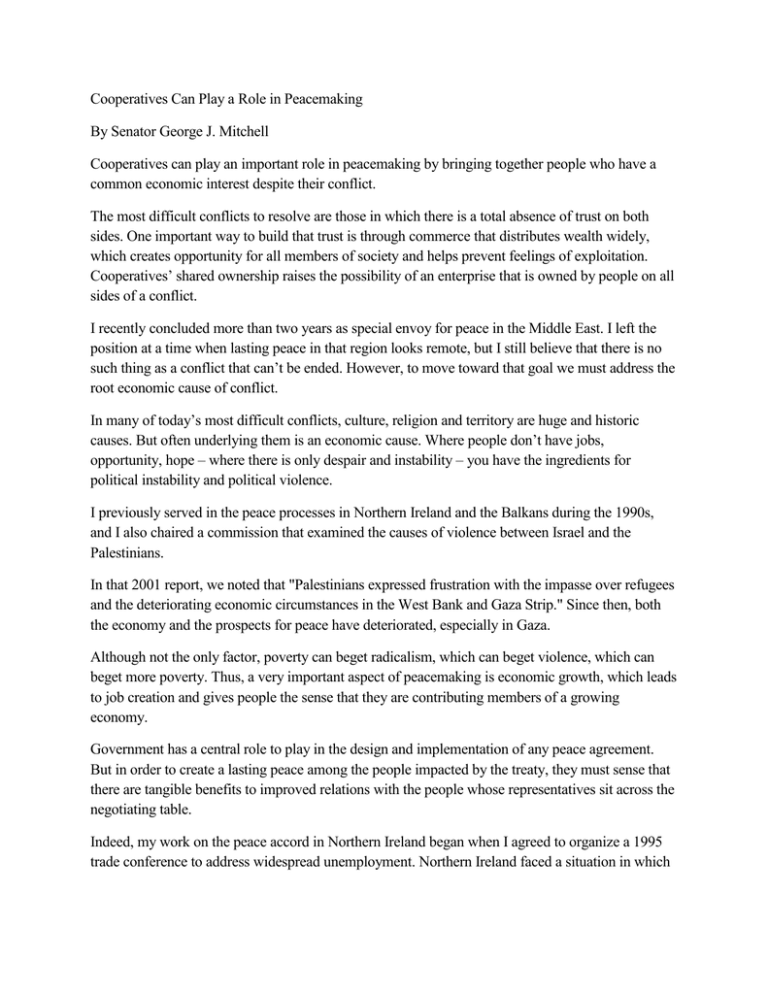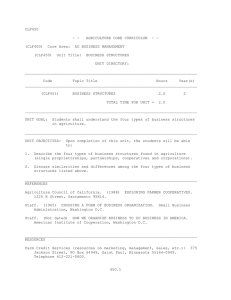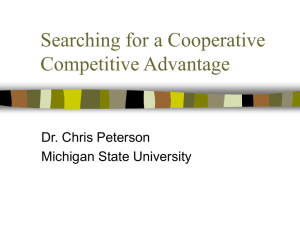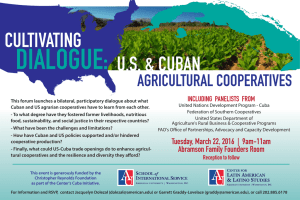Cooperatives Can Play a Role in Peacemaking
advertisement

Cooperatives Can Play a Role in Peacemaking By Senator George J. Mitchell Cooperatives can play an important role in peacemaking by bringing together people who have a common economic interest despite their conflict. The most difficult conflicts to resolve are those in which there is a total absence of trust on both sides. One important way to build that trust is through commerce that distributes wealth widely, which creates opportunity for all members of society and helps prevent feelings of exploitation. Cooperatives’ shared ownership raises the possibility of an enterprise that is owned by people on all sides of a conflict. I recently concluded more than two years as special envoy for peace in the Middle East. I left the position at a time when lasting peace in that region looks remote, but I still believe that there is no such thing as a conflict that can’t be ended. However, to move toward that goal we must address the root economic cause of conflict. In many of today’s most difficult conflicts, culture, religion and territory are huge and historic causes. But often underlying them is an economic cause. Where people don’t have jobs, opportunity, hope – where there is only despair and instability – you have the ingredients for political instability and political violence. I previously served in the peace processes in Northern Ireland and the Balkans during the 1990s, and I also chaired a commission that examined the causes of violence between Israel and the Palestinians. In that 2001 report, we noted that "Palestinians expressed frustration with the impasse over refugees and the deteriorating economic circumstances in the West Bank and Gaza Strip." Since then, both the economy and the prospects for peace have deteriorated, especially in Gaza. Although not the only factor, poverty can beget radicalism, which can beget violence, which can beget more poverty. Thus, a very important aspect of peacemaking is economic growth, which leads to job creation and gives people the sense that they are contributing members of a growing economy. Government has a central role to play in the design and implementation of any peace agreement. But in order to create a lasting peace among the people impacted by the treaty, they must sense that there are tangible benefits to improved relations with the people whose representatives sit across the negotiating table. Indeed, my work on the peace accord in Northern Ireland began when I agreed to organize a 1995 trade conference to address widespread unemployment. Northern Ireland faced a situation in which militia participation was seen by many young men as an economic opportunity as well as a patriotic cause. What first seemed like a simple trade conference led to years of multi-party negotiations that eventually yielded the Good Friday Agreement. That diplomatic success was the beginning of a lasting peace that has now held for more than a decade. Consider three reasons why cooperatives can be an important part of economic peacemaking. First, cooperatives have a long history of bridging conflict. The International Co-operative Alliance has held together through more than a century of wars, despite having members from nations on both sides of both World Wars as well as the Cold War. Co-ops have provided a channel for dialogue among peoples, even when their respective governments are not talking. Second, co-ops exist to meet people’s needs, which are paramount in the wake of violent conflict. Situations in which violent conflict has been occurring are not always conducive to attracting outside investment. And outside investors are more likely to withdraw if the long reconciliation period faces a period of revived tension. So the local ownership of cooperatives provides a locallyrooted form of economic development. Finally, co-ops are based in their communities and can help give people the opportunity to work together on small-scale democracy. In some cases, co-ops can bring together members of different parties in a conflict as members of a single cooperative, providing a shared economic interest. Unlike investment by outsiders, these shared enterprises rebuild civil society as they rebuild the economy. Negotiations seek to get political leaders to reach agreement, and sometimes that only lasts long enough for a vote. Such a moment of agreement is essential, as it provides the foundation for the peaceful stability on which economic growth depends. But it is not always enough. Cooperatives can help build trust and shared economic opportunity, and thus improve the chances of lasting peace. Senator George Mitchell is the former US special envoy for Middle East peace. He previously served as the US Senate Majority leader and special envoy to Northern Ireland.



